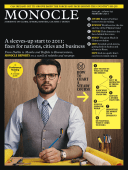
Issue 40
In February’s issue it’s time for a rethink, as Monocle focuses on nations that need fixing and cities that need sorting, from Dublin to Manila.
In This Issue
Oops! No content was found.
Looks like we no longer have content for the page you're on. Perhaps try a search?
Return Home

